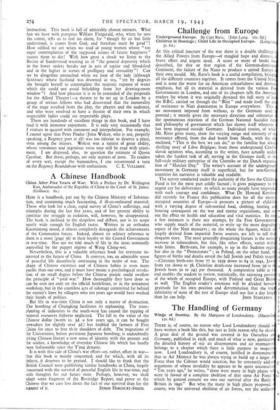A Chinese Handbook China After Five Years of War. With
a Preface by Dr. Wellington Koo, Ambassador of the Republic of China to the Court of St. James. (Gollancz. 6s.) HERE is a handbook, put out by the Chinese Ministry of Informa- tion, and containing much fascinating, if ill-co-ordinated material. Those who look for a clear, rapid survey of China's sufferings, and triumphs during the last five years, and of her present ability to continue the struggle in isolation, will, however, be disappointed. The book is inclined to the shapeless and diffuse, nor is its scope nearly wide enough for English tastes. Written in an orthodox Kuomintang mood, it almost completely disregards the achievements of the Communist forces. Indeed, almost its solitary reference to them is a sneer (page 36) at their loyalty to the Central Government in war-time. Nor are we told much of life in the areas nominally controlled by the puppet regime of Wang Ching-wei.
Nevertheless, this is a valuable reference book for everyone in- terested in the future of China. It conveys, too, an admirable sense of peaceful life dauntlessly continuing in the midst of war. The shape of Chinese existence and of Chinese habits is even more pacific than our own, and it must have meant a psychological revolu- tion of no small degree before the Chinese people could swallow the principle of " total war." How thoroughly they have done so can be seen not only on the official battlefront, or in the armament workshop, but in the countless acts of sabotage committed far behind the enemy's lines by villagers who ten years ago would have washed their hands of politics.
But life in war-time China is not only a matter of destruction. The bombing of Chungking facilitates its replanning. The trans- planting of industries to the south-west has caused the tapping of mineral resources hitherto neglected. The fall in the value of the Chinese dollar (worth is. 3d. a few years ago, it can be bought nowadays for slightly over 3d.) has enabled the farmers of Free China for once to free th :ir shoulders of debt. The migrations of the Universities, before persistent Japanese bombing, is undoubtedly riving Chinese literati a new sense of identity with the peasant and the soldier, a knowledge of everyday Chinese life which has hardly been fashionable since the Tang dynasty.
It is with this side of China's war effort—or, rather, effort in war— that this book is mainly concerned, and for which, with all its defects, it deserves to be praised. I should like to think that the British Council were publishing similar handbooks in China, largely :oncerned with the survival of peaceful English life in war-time, and with thoughts for our future state. Perhaps, however, we shall adopt some fragment of the Beveridge Report, and prove to the Chinese that we care less about the fact of our survival than for the


























 Previous page
Previous page